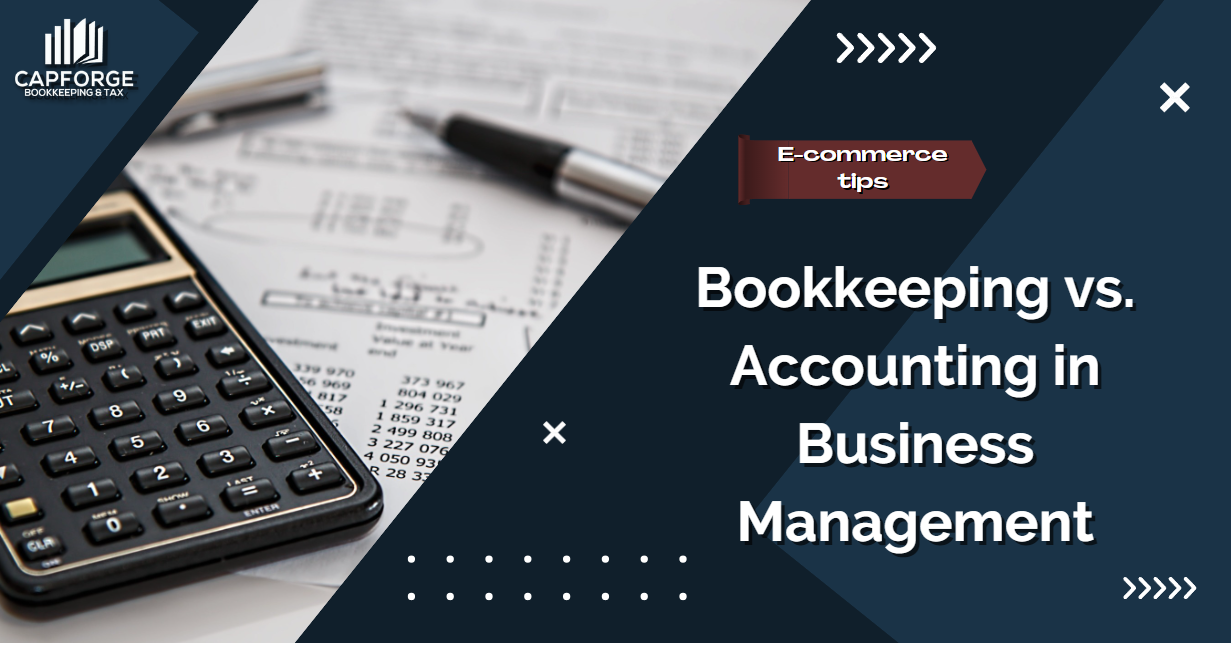Bookkeeping vs. Accounting in Business Management
In the realm of business management, the terms “bookkeeping” and “accounting” are closely linked together. While these processes differ in how they’re executed, the goal remains the same, and that is to paint a clear picture of a company’s overall financial status.
Being that financial management serves as the backbone of a business, it’s important to understand how bookkeeping and accounting work. Let’s clarify these terms in more detail by reading this blog post!
Bookkeeping: The Foundation of Financial Records
Bookkeeping establishes the groundwork for maintaining transparent, accountable, and well-managed financial records, serving as an essential pillar in the broader framework of financial management.
The process involves meticulously recording, organizing, and maintaining financial transactions within an organization. A bookkeeper documents the income, expenses, assets, and liabilities in a structured manner to create a clear and accurate record of the company’s financial activities.
This systematic recording is key to painting a clear picture of a company’s financial position. Some of the duties and responsibilities of a bookkeeper include:
- Recording financial transactions: Bookkeepers document all financial activities, such as sales, purchases, receipts, and payments, in the appropriate ledger accounts.
- Reconciling accounts: They ensure that the balances in various accounts are accurate by reconciling statements from banks, creditors, and debtors with the company’s records.
- Generating financial statements: Bookkeepers prepare basic financial statements, including income statements, balance sheets, and cash flow statements, which provide insights into the organization’s financial health.
- Managing payroll: They calculate wages, deductions, and taxes, ensuring that employees are paid accurately and on time.
- Monitoring cash flow: Bookkeepers keep track of incoming and outgoing cash, helping businesses maintain sufficient liquidity to meet their operational needs.
- Compliance and regulations: They ensure that financial records comply with local, state, and federal regulations and assist in the preparation of tax returns and other statutory filings.
Fulfilling these tasks helps maintain transparency, ensure compliance with regulations, and assess the financial health and stability of an organization.
Accounting: Interpretation and Decision-Making
In simple terms, accounting is akin to keeping a detailed diary of a company’s money. Just like you’d jot down your daily expenses and income in a personal journal, accounting tracks all the money coming in and going out of your business.
The scope of accounting extends to financial analysis, budgeting, forecasting, internal controls, and compliance with accounting standards and regulatory requirements. It serves as a critical tool for decision-making, strategic planning, and performance evaluation, providing management and stakeholders with the necessary information to make sound financial decisions based on the current financial health of the company.
Accountants fulfill their role by completing the following tasks:
- Analyzing financial transactions: Accountants meticulously document all monetary activities and assess their impact on the company’s financial position.
- Financial reporting: They prepare and interpret essential financial statements, such as income statements, balance sheets, and cash flow statements, providing stakeholders with insights into the company’s performance and financial health.
- Budgeting and forecasting: Accountants assist in creating budgets, setting financial goals, and developing forecasts based on historical data and market trends, aiding in strategic planning and resource allocation.
- Tax planning and compliance: They navigate the complex landscape of tax laws and regulations, ensuring that the company complies with all tax obligations while optimizing tax strategies to minimize liabilities.
- Internal controls and risk management: Accountants implement and monitor internal controls to safeguard assets, prevent fraud, and mitigate financial risks, thereby ensuring the company’s financial stability and integrity.
More often, accountants serve as trusted advisors, offering financial insights, interpreting data, and providing guidance on various financial matters to support informed decision-making by management and other stakeholders.
What is the Difference Between Bookkeeping and Accounting?
The difference between bookkeeping and accounting lies in their scope, purpose, and complexity within the realm of financial management.
With bookkeeping, the main focus is to maintain accurate records of a company’s day-to-day financial transactions. Essentially, bookkeeping is the foundation upon which all financial information is built, providing the raw data that accountants use for further analysis and reporting.
Accounting, on the other hand, encompasses a broader and more analytical role in managing and interpreting financial information. Accountants use the data compiled by bookkeepers to prepare financial statements, analyze trends, assess performance, and provide strategic insights to stakeholders. They are also responsible for ensuring compliance with accounting standards and regulations, conducting audits, and advising on various financial matters.
So, while bookkeeping focuses on the nitty-gritty of recording transactions, accounting looks at the broader picture, providing insights and understanding from those records to guide decisions and strategies.
Can One Person Handle Bookkeeping and Accounting?
Yes, it is possible for one person to handle both bookkeeping and accounting responsibilities, especially in smaller businesses or startups where the financial operations may not be as complex. In such scenarios, a single individual may perform a dual role, maintaining the daily records of financial transactions (bookkeeping) while also analyzing the data, preparing financial statements, and providing insights and reports (accounting).
However, as the size and complexity of a business grow, the workload and expertise required for both bookkeeping and accounting functions may become more demanding. Larger organizations often separate these roles to ensure greater accuracy, efficiency, and compliance with financial regulations and standards. Specialized software and tools are also commonly used to streamline processes and enhance productivity in managing both bookkeeping and accounting tasks.
While it is feasible for one person to manage both functions, the effectiveness of such an arrangement depends on the individual’s skills, experience, and ability to handle the diverse responsibilities associated with both bookkeeping and accounting.
Conclusion
Understanding the nuanced differences between bookkeeping and accounting is crucial for businesses and professionals alike, as it underscores the importance of each role in maintaining financial transparency, integrity, and success.
At the end of the day, both these processes serve as essential pillars in the decision-making process by transforming raw financial data into meaningful insights that empower stakeholders to make informed choices, mitigate risks, and drive organizational success.
If you need any help with bookkeeping and accounting services, our team is ready to assist you. Simply fill out the form below, and we’ll get in touch with you shortly.








